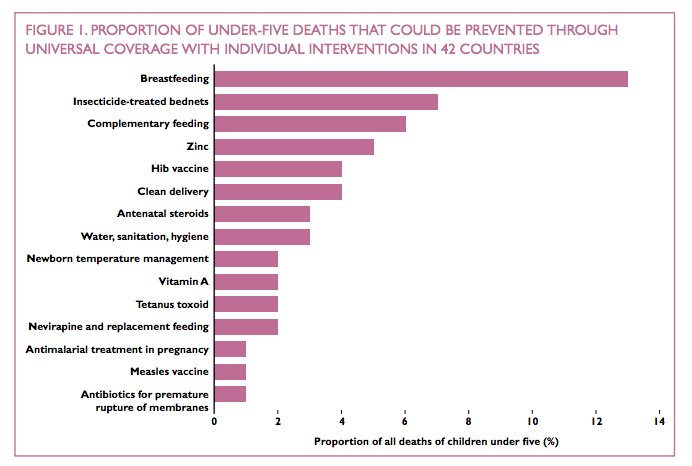Can breastfeeding save lives?
"BREASTFEEDING within 60 minutes of birth could save 95 babies per hour — 830,000 a year, says a charity."
The Express, February 18, 2013
"If the mother continues feeding for the next six months, then a child growing up in the developing world is up to 15 times less likely to die from killer diseases such as pneumonia and diarrhoea, the report said."
Sky News, February 18, 2013
"Are you mom enough?" asked one of Newsweek's last covers before the magazine went fully digital last month, and with la Leche League International - an international pro-breastfeeding lobby group - arguing in favour and various thinkers making their case against, breastfeeding has certainly become a contentious issue.
Today's papers, however, claim that for some it may be a matter of life and death.
The research they cite was carried out by Save the Children, which yesterday published its report on "Superfood for babies: how overcoming barriers to breastfeeding will save children's lives."
In their report, the charity claim that 830,000 child deaths could be prevented each year if mothers breastfed their child within an hour of their birth.
So where do these figures come from? (Brace yourselves, this may be more complicated than you think.)
The charity found two recent and thorough studies which focussed on the benefits of breastfeeding in preventing neonatal mortality: one from Ghana and another one from Nepal (published in 2008 in the Journal of Nutrition).
The study based in Ghana found that 41% of neonatal deaths from two days of life onwards could be prevented if all infants were breastfed within 24 hours of birth.
The study in Nepal found that an 43% of all deaths from day 3-28 may be avoided if every baby was breast-fed within the first hour of life.
Once again, this doesn't tell us how, based on these studies, the charity came to the conclusion that the "power hour" could save 95 children per hour. We contacted Save the Children to find out.
The charity told us that thanks to the 2012 UNICEF report on the State of the World's Children we know there are a total 3.1 million neonatal deaths every year.
A 2005 paper by the Neonatal Survival Steering Team estimated that 25-45% of all neonatal deaths occur within the first day. Save the Children picked a central estimate of 35%. This means 65% occur after the first day. So roughly 2 million newborn deaths occur after the first day.
As it is estimated that 41% of neonatal deaths could be prevented if the infants were breastfed immediately, this means 830,000 lives could be saved (i.e. 41.3% of 2 million).
The Save the Children researchers also point out that breastfeeding - and more specifically the "power hour" - is of course not the only way you can improve a child's chances of surviving. As the chart below illustrates, there are many other factors to be considered.

The charity also admitted that there is a paucity of available information and that "much of the data on breastfeeding trends is out of date and some countries have not measured their rates of breastfeeding for over a decade."
Conclusion
Though the figures themselves are based on academic research, the conclusions remain based on local findings and some factors may be attributable to country-specific conditions, such as access to nutrious food, high rates of poverty, the lack of access to health care and the prevalence of diseases.
Furthermore, these conditions don't necessarily apply to the rest of the world. Whilst the global average neonatal mortality rate is 23 per 1000, in Nepal and Ghana it goes up to 28 per 1000, but in the UK that rate lowers to 3 per 1000. Of course, Save the Children made these caveats clear in their report.
Even in terms of these neonatal deaths, data from the Office for National Statistics show that in the UK 85.9% in 2011 were related to events occurring before the actual birth like congenital anomalies, antepartum infections and immaturity related conditions. None of these could have been prevented by breastfeeding.
----
Flickr image courtesy of OhKyleL